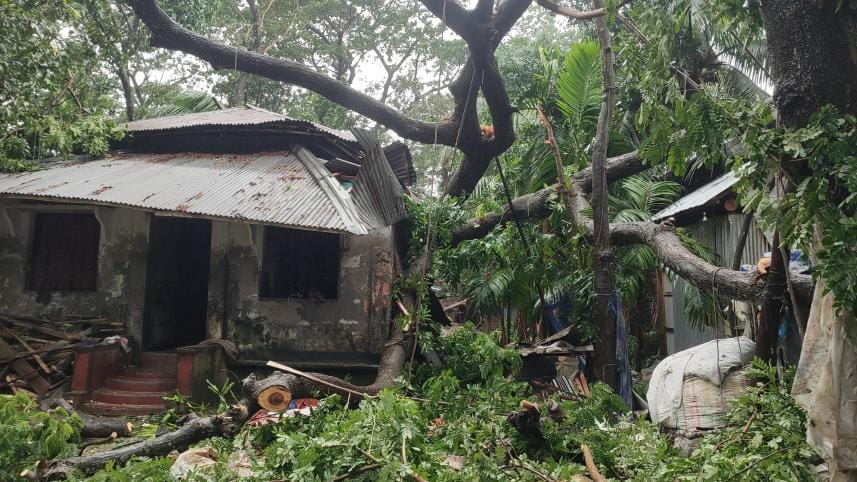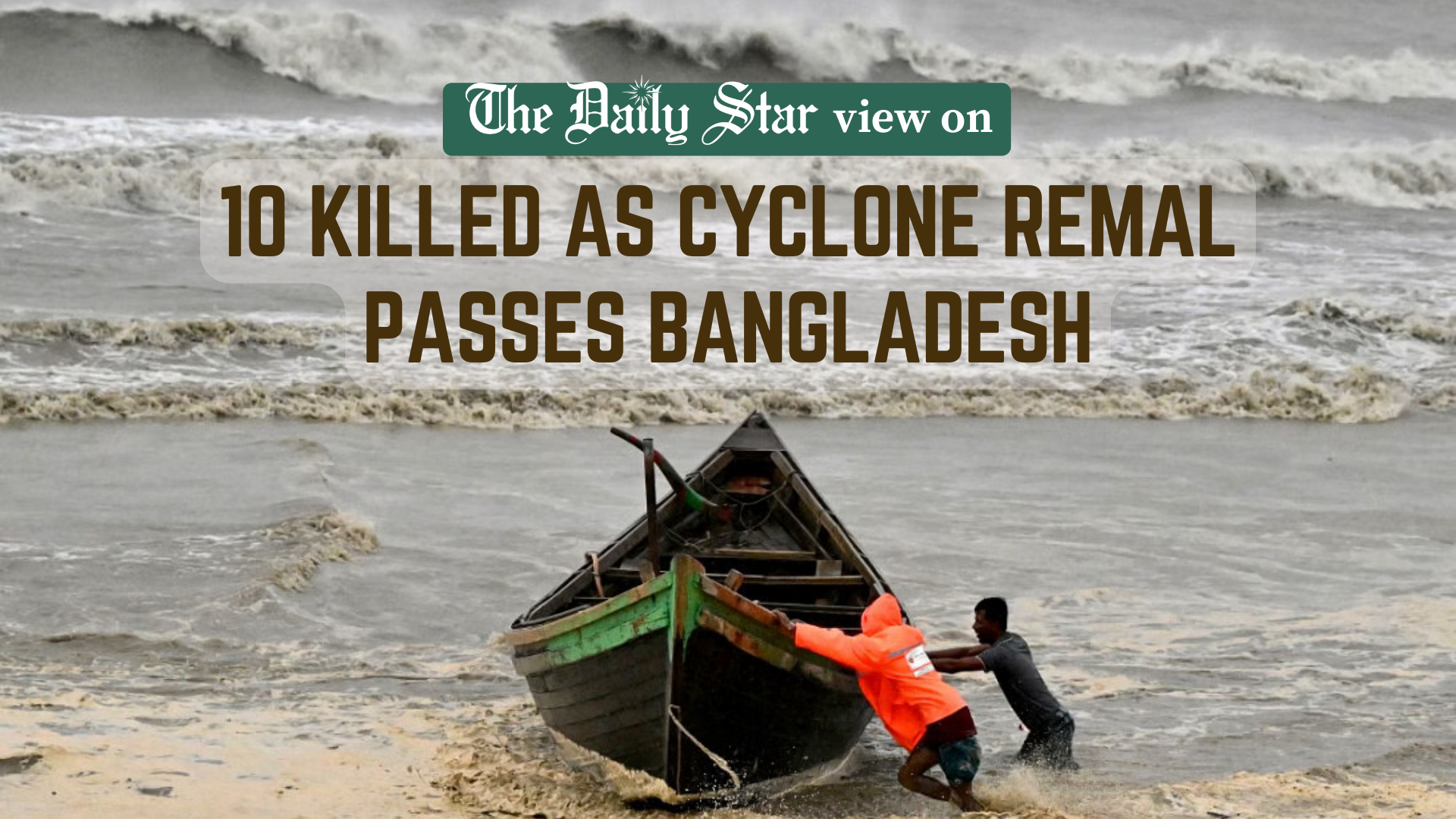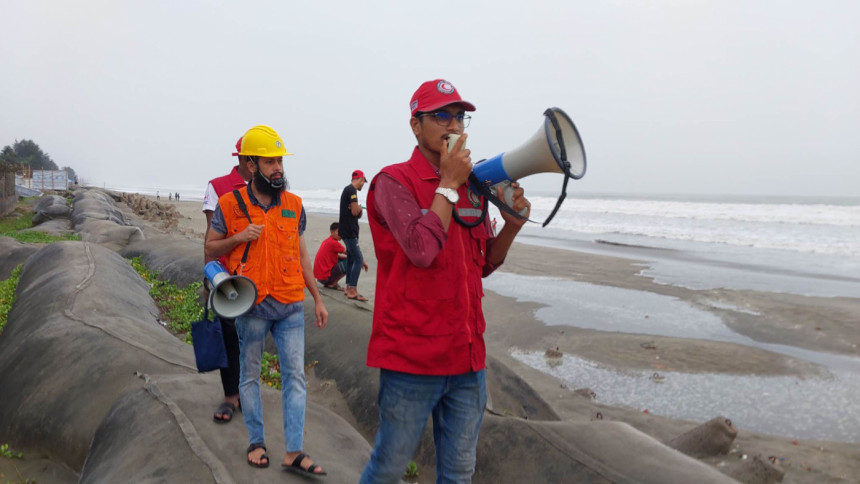Cyclone survivors are not just numbers

On Sunday, as the news ticker kept on updating about Cyclone Remal, a few colleagues of mine expressed concern about coming to work the next day, dreading the deluge from the resulting rain in Dhaka. Being a Dhakaite myself, I understood their concern as an hour of rain can paralyse parts of the city with waterlogging and the consequent traffic congestion, but at that moment, it felt like a peevish complaint. My thoughts, instead, travelled about 320 kilometres south to Shyamnagar, Satkhira. Two years ago, I visited several unions of the area as part of an unfinished thesis. Lined along the northern edge of the Sundarbans, these unions are home to several thousand people who experience the harsh reality of cyclones first-hand almost every year.
Increasing water salinity due to climate change and profuse shrimp farming have turned the land in this region almost uncultivable for crops. Most men in the region thus get involved in fishing or migrate to other places to work as daily labourers. The majority of women, meanwhile, work for the shrimp industry, collecting fry dawn to dusk from the saline waters of the Sundarbans delta. It is these women—Aasia, Masura, Reshma, Tulsi, Karuna, to name a few—that I was thinking about as Remal hit Bangladesh.
These women shared with me their stories of all the cyclones they had witnessed in their lifetimes. All those weather events that destroyed or damaged their houses, belongings and at times took away their loved ones, including domestic animals; the hours, days and nights they could not sleep either in crowded cyclone shelters or standing on dykes under the open sky. I wondered where they were, at that very moment, hours before Remal hit the Bangladeshi coast. Were they able to make it to the cyclone shelters in time? Many of them spoke about the lack of security in the cyclone shelters where people from different neighbourhoods gather and the sexual harassment they face. I recalled Reshma telling me how she had chosen to send her teenage daughter to a relative's house after getting the warning about Cyclone Sitrang in 2022, instead of taking her to the shelter. What did Reshma do this time, I wondered.
Thankfully, a colleague who works in Satkhira informed me that the condition of the cyclone shelters he visited in Shyamnagar appeared better this time. The ones he visited only had women, children and senior citizens; most of the men, he guessed, stayed back home to guard and take care of their belongings. While many of us fail to see the rationale behind such behaviour—people choosing to stay back and not going to the cyclone shelters—how can we grasp the emotional and financial stress attached to losing everything you have every single year? Most of us who live far away from these calamities get affected for a day or two at best. The mark of these disasters are not lasting in our lives, like the cracks and water stains left on the walls of Reshma's or Halima's half-pucca and mud huts.
We can sympathise with the cyclone victims, but are we able to put ourselves in their shoes? Can I really understand what it would mean for Aasia and Masura to lose the tiny fishing dinghy they had taken me out on for a ride in the Chuna River? The little boat is a means of earning for them. They spend long hours every day going up and down the river collecting shrimp fry from the saline river water to sell to the farms. Did the boat survive the cyclone?
When we report about natural disasters, these individual people and their stories often become statistics. Their everyday struggle is lost in the larger picture. We read about the loss of lives and property, we talk about the impacts of climate change, frequent cyclones, their intensities and then move on with our lives. I know Reshma, Aasia, Masura will too. They will return to their damaged homes and belongings and start rebuilding their lives from scratch, knowing that Remal will not be the last cyclone they will experience in their lives.
In fact, many of these women could not name all the cyclones they had witnessed, or the exact dates of each, when I asked them two years ago. I wonder if their minds trick them into forgetting the trauma of these disasters so as to prepare them for the next ones. Perhaps this is the very resilience that brings them international praise, which, though nice, does not change anything for these people.
These coastal women are familiar with climate change and the concept of climate justice, thanks to the many NGOs working in the area. They inquire about their share of the climate fund, which I doubt would ever be delivered in their lifetimes, based on the current attitude of the global powerhouses. Direct financial compensation to climate change victims appears far-fetched.
I don't know if Reshma, Masura, Aasia or Karuna count on this fund or plan their lives hoping for it, but one thing is for sure: they don't want to become climate migrants, not unless they have to. While many of their friends and relatives migrated to the urban areas as climate refugees, Reshma, Masura and Aasia's families stayed behind. Remal and the other cyclones may uproot them from their homes for a day or a few months. When the cyclone's fury ends, they return home, repair their broken houses, or build new ones, or break their back working from dawn to dusk in the increasing saline waters of the coastal rivers to collect shrimp fry and save up for a stronger home, and a difficult yet hopeful future.
Tamanna Khan is a member of the editorial team at The Daily Star.
Views expressed in this article are the author's own.
Follow The Daily Star Opinion on Facebook for the latest opinions, commentaries and analyses by experts and professionals. To contribute your article or letter to The Daily Star Opinion, see our guidelines for submission.



 For all latest news, follow The Daily Star's Google News channel.
For all latest news, follow The Daily Star's Google News channel. 

Comments